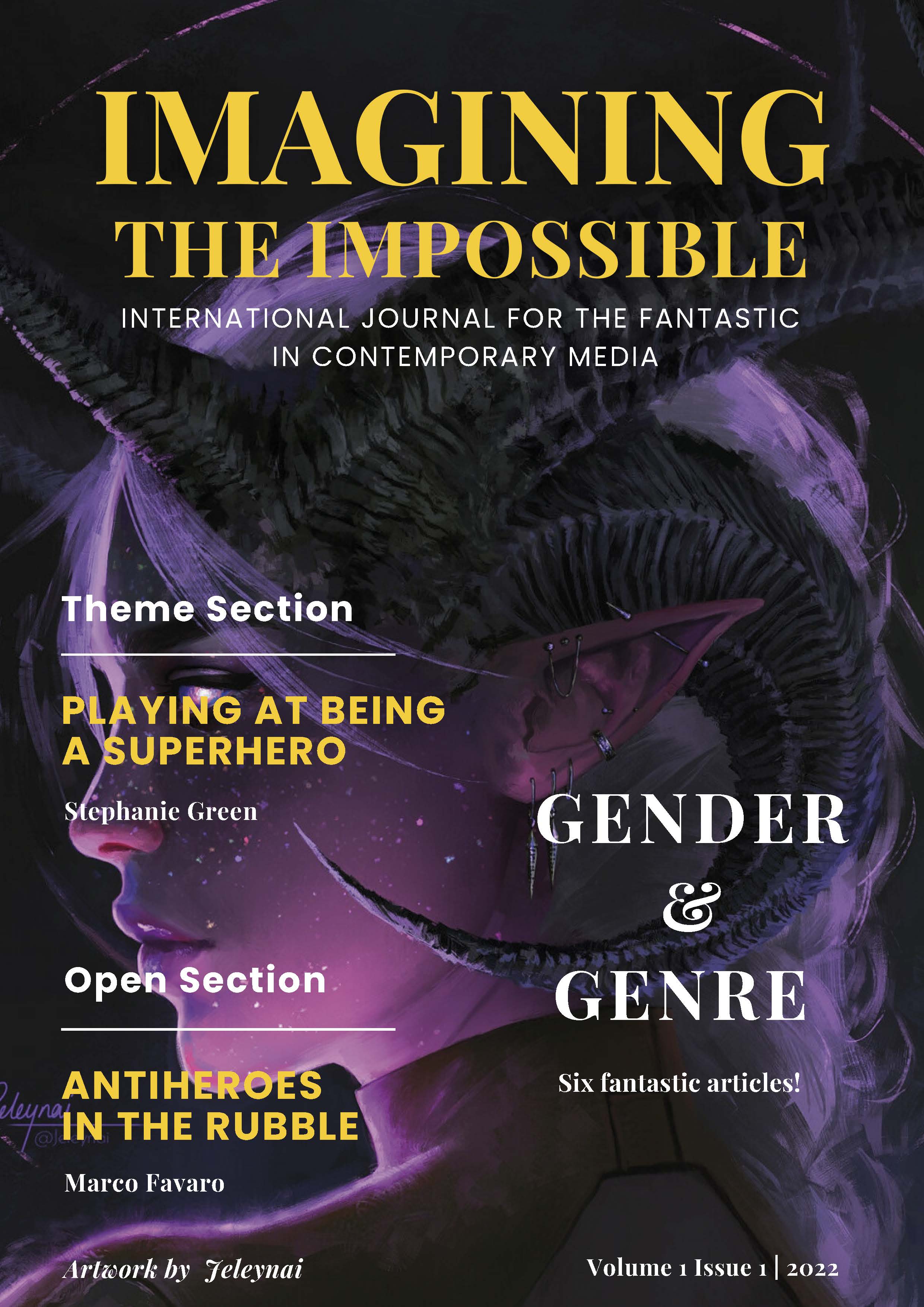Representation, Otherness and Fantastic Storyworlds: Breaking Gender Binaries and Reworking Identities in Game of Thrones
DOI:
https://doi.org/10.7146/imaginingtheimpossible.129475Keywords:
Television, Game of Thrones, gender, fantasy storyworld, representation, othernessAbstract
Game of Thrones’ (HBO, 2011-2019) fantastic storyworld incorporates narrative and representational arcs that interrogate its gendered social, cultural and political framework. Working from Schubart and Gjelsvik’s (2016:1) assertion that the show’s female characters are ‘key to the originality […], appeal and popularity of the GoT universe’, I argue that the show capitalizes on fantasy’s position outside the realities and limitations of the human condition. In doing so, it challenges representational binaries through characters like Cersei Lannister (Lena Headey) and Arya Stark (Maisie Williams) from their respective positions within and outside of the structures of power. They push back against the gendered expectations imposed on them by the patriarchal established order, reworking their own identities to forge their own paths. My analysis therefore reflects the scope for a multiplicity of complex identities to emerge within the show and for a deeper understanding of the representational possibilities in television.
References
Beem, Charles E. 2020. “The Royal Minorities of Game of Thrones.” In Queenship and the Women of Westeros: Female Agency and Advice in Game of Thrones and A Song of Ice and Fire, edited by Zita Eva Rohr and Lisa Benz, 189-204. Abingdon: Routledge. https://doi.org/10.1007/978-3-030-25041-6_9
Carroll, Shiloh. 2015. “‘You Ought to Be in Skirts and Me in Mail’: Gender and History in George R. R. Martin’s A Song of Ice and Fire.” In George R. R. Martin’s A Song of Ice and Fire and the Medieval Literary Tradition, edited by Bartlomiej Blaszkiewicz, 247-259. Warsaw: Wydawnictwa Uniwersytetu Warszawskiego. https://doi.org/10.31338/uw.9788323514350.pp.247-260
Connell, Raewyn W. 1987. Gender and Power: Society, the Person and Sexual Politics Cambridge: Polity Press.
Connell, Raewyn W. and James Messerschmidt. 2005. “Hegemonic Masculinity: Rethinking the Concept.” Gender & Society 19 (6): 829-859. https://doi.org/10.1177/0891243205278639
Coopey, Louise. 2020. “Where the Streets Have No Shame: Queen Cersei Lannister’s Journey to Alternative Patriarchy.” In Antiheroines of Contemporary Media: Saints, Sinners, and Survivors, edited by Melanie Haas, N. A. Pierce and Gretchen Busl, 99-118. Lanham: Rowman & Littlefield.
Evans, Tobi. 2018. “Vile, Scheming, Evil Bitches? The Monstrous Feminine Meets Hegemonic Masculine Violence in A Song of Ice and Fire and Game of Thrones.” Aeternum 5 (1): 14-27.
Fowkes, Katherine A. 2010. The Fantasy Film. Chichester: Wiley-Blackwell. https://doi.org/10.1002/9781444320589
Furby, Jacqueline and Claire Hines. 2012. Fantasy. Abingdon: Routledge. https://doi.org/10.4324/9780203804452
Game of Thrones. 2011. Season 1, Episode 1, “Winter Is Coming.” Directed by Tim Van Patten. Aired April 17, 2011 on HBO.
Game of Thrones. 2011. Season 1, Episode 4, “Cripples, Bastards and Broken Things.” Directed by Brian Kirk. Aired May 8, 2011 on HBO.
Game of Thrones. 2011. Season 1, Episode 5, “The Wolf and the Lion.” Directed by Brian Kirk. Aired May 15, 2011 on HBO.
Game of Thrones. 2011. Season 1, Episode 6, “A Golden Crown.” Directed by Daniel Minahan. Aired May 22, 2011 on HBO.
Game of Thrones. 2011. Season 1, Episode 10, “Fire and Blood.” Directed by Alan Taylor. Aired June 19, 2011 on HBO.
Game of Thrones. 2012. Season 2, Episode 9, “Blackwater.” Directed by Neil Marshall. Aired May 27, 2012 on HBO.
Game of Thrones. 2013. Season 3, Episode 4, “And Now His Watch is Ended.” Directed by Alex Graves. Aired April 21, 2013 on HBO.
Game of Thrones. 2015. Season 5, Episode 8, “Hardhome.” Directed by Miguel Sapochnik. Aired May 31, 2015 on HBO.
Game of Thrones. 2017. Season 7, Episode 7, “The Dragon and the Wolf.” Directed by Jeremy Podeswa. Aired August 27, 2017 on HBO.
Game of Thrones. 2019. Season 8, Episode 3, “The Long Night.” Directed by Miguel Sapochnik. Aired April 28, 2019 on HBO.
Hall, Stuart. 1997. Representation: Cultural Representation and Signifying Practices. London: SAGE.
Jackson, Rosemary. 1981. Fantasy: The Literature of Subversion. London: Routledge.
Johnson, Catherine. 2015. “Telefantasy.” In The Television Genre Book, edited by Glen Creeber, 56-59. London: BFI.
Mittell, Jason. 2015. Complex TV: The Poetics of Contemporary Television Storytelling. New York: New York University Press.
Schippers, Mimi. 2007. “Recovering the Feminine Other: Masculinity, Femininity, and Gender Hegemony.” Theory and Society 36 (1): 85-102. https://doi.org/10.1007/s11186-007-9022-4
Schubart, Rikke and Anne Gjelsvik. 2016. “Introduction.” In Women of Ice and Fire: Gender, Game of Thrones and Multiple Media Engagements, edited by Anne Gjelsvik and Rikke Schubart, 1-16. New York: Bloomsbury. https://doi.org/10.18261/issn.0805-9535-2016-04-08
Wells-Lassagne, Shannon. 2015. “Divided Loyalties: Opening Sequences in Small-Screen Fantasy Adaptations.” Screen 56 (2): 269-275. https://doi.org/10.1093/screen/hjv032
Wood, Robin. 2002. “The American Nightmare Horror in the 70s.” In Horror: The Film Reader, edited by Mark Jancovich, 25-32. London: Routledge.
Zipes, Jack. 2009. “Why Fantasy Matters Too Much.” The Journal of Aesthetic Education, vol. 43, no. 2: 77-91. https://doi.org/10.1353/jae.0.0039
Downloads
Published
How to Cite
Issue
Section
License
Copyright (c) 2022 Louise Coopey

This work is licensed under a Creative Commons Attribution 4.0 International License.
Copyright author. CC by license 4.0.




